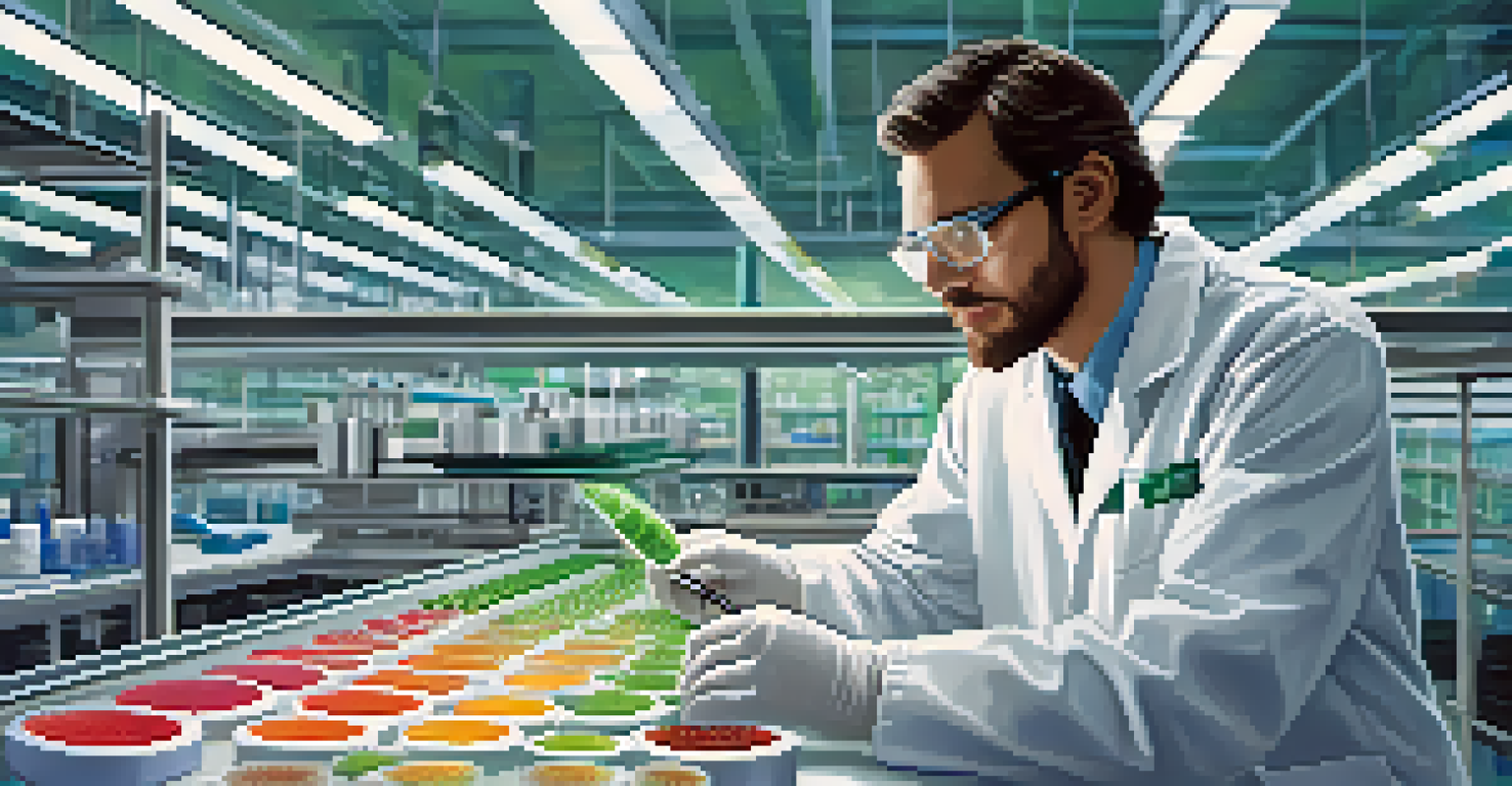Ethical Considerations in Genetic Engineering of Crops

Understanding Genetic Engineering in Agriculture
Genetic engineering in agriculture involves altering a crop's DNA to enhance desired traits, such as pest resistance or improved nutritional content. This technology has the potential to increase food security and reduce the need for chemical pesticides, which can be beneficial for both farmers and consumers. However, while the science is promising, it raises critical ethical questions about the long-term impacts on ecosystems and human health.
Agricultural biotechnology has the potential to produce food more efficiently and to improve resilience to climate change, but we must proceed with caution and rigor in evaluating its impacts.
One of the primary concerns is the potential for genetic modifications to unintentionally affect non-target species. For instance, a genetically modified crop designed to repel pests might also harm beneficial insects, disrupting local ecosystems. This ripple effect highlights the need for careful consideration of ecological balance when introducing engineered organisms into the environment.
Moreover, the implications of genetic engineering extend beyond the environment; they touch on cultural and social dimensions. Many communities have deep-rooted agricultural practices that could be threatened by the introduction of genetically modified crops. Thus, it’s essential to engage with diverse stakeholders to understand their perspectives and values surrounding food production.
The Role of Regulation in Genetic Engineering
Regulation plays a crucial role in ensuring that genetically engineered crops are safe for human consumption and the environment. Different countries have varying regulatory frameworks, which can lead to confusion and mistrust among consumers. For instance, while the United States has a relatively relaxed approach, the European Union enforces stricter guidelines that require extensive testing and labeling.

This discrepancy raises questions about the adequacy of safety assessments. Are the current regulations sufficient to protect public health, or are they lagging behind the fast-paced advancements in genetic engineering? Striking the right balance between innovation and safety is a complex challenge that policymakers must navigate carefully.
Ethics in Genetic Engineering
The introduction of genetically modified crops raises important ethical questions regarding environmental impact, cultural practices, and corporate control over agriculture.
Furthermore, the transparency of these regulatory processes is vital for public trust. When consumers feel informed and included in discussions about the safety and ethics of genetically engineered crops, they are more likely to accept these innovations. Clear communication about the benefits and risks associated with genetic engineering can help bridge the gap between scientists and the public.
Ethical Implications for Farmers and Communities
Farmers are often at the forefront of the debate surrounding genetic engineering. While they may benefit from increased yields and reduced pesticide use, there are ethical implications regarding dependency on biotechnology companies. Many farmers may find themselves locked into purchasing specific seeds that require proprietary technology, raising concerns about corporate control over agriculture.
The great challenge of our time is to create a sustainable agriculture system that respects both innovation and the values of the communities it serves.
Moreover, the introduction of genetically modified (GM) crops can lead to economic disparities. Larger agribusinesses may thrive, while smallholder farmers struggle to compete, exacerbating existing inequalities in rural communities. This situation calls for ethical considerations about equity and access within the agricultural sector.
Communities must also grapple with the cultural significance of traditional farming practices. The introduction of GM crops can undermine local customs and knowledge systems that have been developed over generations. Therefore, it is crucial to support agricultural diversity and respect local choices while considering the benefits of genetic engineering.
Public Perception and Misinformation
Public perception of genetically engineered crops is often shaped by misinformation and fear. Many consumers associate GMOs with negative health impacts, despite scientific evidence indicating that they are safe to eat. This disconnect can lead to widespread anxiety and resistance, complicating the dialogue around agricultural innovation.
Social media plays a significant role in spreading both information and misinformation. Viral posts can quickly shape public opinion, often without the context or nuance that complex topics like genetic engineering require. Educating the public with accurate information is essential to dispel myths and foster informed discussions about the potential benefits and risks.
Role of Regulation and Trust
Effective regulation and clear communication are essential for ensuring the safety of genetically engineered crops and building public trust.
Efforts to improve public understanding should focus on transparency and engagement. This could involve collaboration between scientists, farmers, and consumers to create platforms for dialogue. By fostering a more informed public, we can create a more constructive conversation about the role of genetic engineering in agriculture.
Environmental Concerns: Biodiversity and Ecosystems
One of the most significant ethical concerns regarding genetic engineering of crops is its impact on biodiversity. Genetically modified organisms (GMOs) can lead to monocultures, where a single crop variety dominates agricultural landscapes. This reduction in biodiversity makes ecosystems more vulnerable to pests and diseases, potentially leading to greater reliance on chemical inputs.
Moreover, there are fears that genetically engineered crops could crossbreed with wild relatives, leading to unintended consequences. Such scenarios can create 'superweeds' that are resistant to herbicides, compounding the challenges faced by farmers. These potential ecological disruptions highlight the importance of rigorous risk assessments before introducing GMOs into the environment.
Protecting biodiversity is not only about preserving the environment; it's also about ensuring food security for future generations. Diverse ecosystems contribute to resilience against climate change and can provide essential services that support agricultural productivity. Therefore, ethical considerations in genetic engineering must prioritize strategies that safeguard ecological integrity.
Balancing Innovation with Ethical Responsibility
As we navigate the complexities of genetic engineering in crops, finding a balance between innovation and ethical responsibility is crucial. The potential benefits of increased food production and sustainability must be weighed against the ethical dilemmas and uncertainties that arise. This requires a thoughtful approach that considers not just the immediate gains, but also the long-term implications for society and the environment.
Collaboration among scientists, policymakers, and the public can foster an ethical framework that guides the development and use of genetically engineered crops. Engaging diverse perspectives ensures that multiple voices are heard, leading to more robust decision-making processes. This collaborative spirit can help us harness the benefits of genetic engineering while addressing the ethical concerns it raises.
Biodiversity and Ecosystem Health
Genetic engineering can threaten biodiversity and ecosystem stability, necessitating careful risk assessments before introducing GMOs into farming practices.
Ultimately, the goal should be to create a sustainable agricultural system that respects both innovation and the values of the communities it serves. By prioritizing ethical considerations, we can work towards an agricultural future that is not only productive but also equitable and responsible.
The Future of Genetic Engineering and Ethics
Looking ahead, the future of genetic engineering in agriculture will likely involve increased technological advancements, including gene editing techniques like CRISPR. These innovations hold great promise for enhancing crop resilience and adapting to climate change. However, as we embrace these new tools, it is essential to remain vigilant about the ethical implications they entail.
Ongoing public dialogue will be critical in shaping the direction of genetic engineering. As societal values evolve, so too will the expectations around the ethical use of biotechnology in agriculture. This dynamic landscape will require continuous engagement with all stakeholders, ensuring that ethical considerations remain at the forefront of discussions.

In conclusion, while genetic engineering offers exciting possibilities for the future of agriculture, it comes with significant ethical responsibilities. By fostering a culture of transparency, inclusivity, and respect for diverse perspectives, we can navigate the challenges ahead and work towards a future where technology serves humanity responsibly.